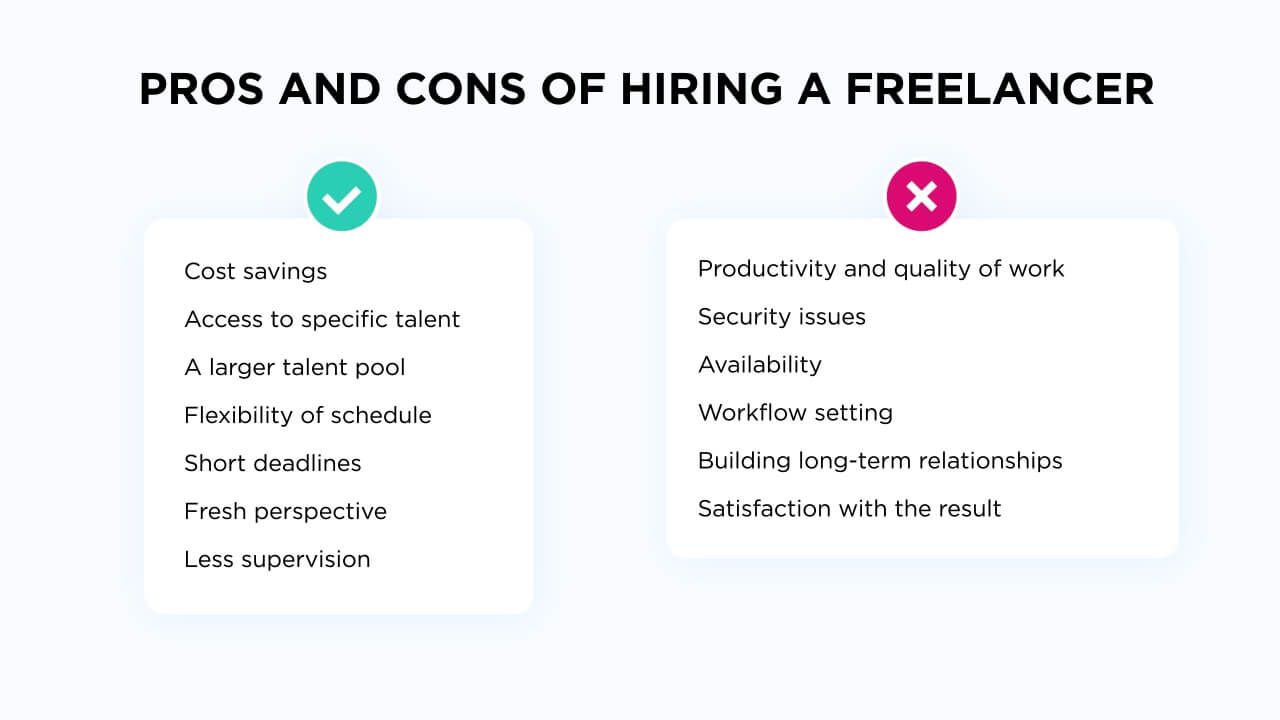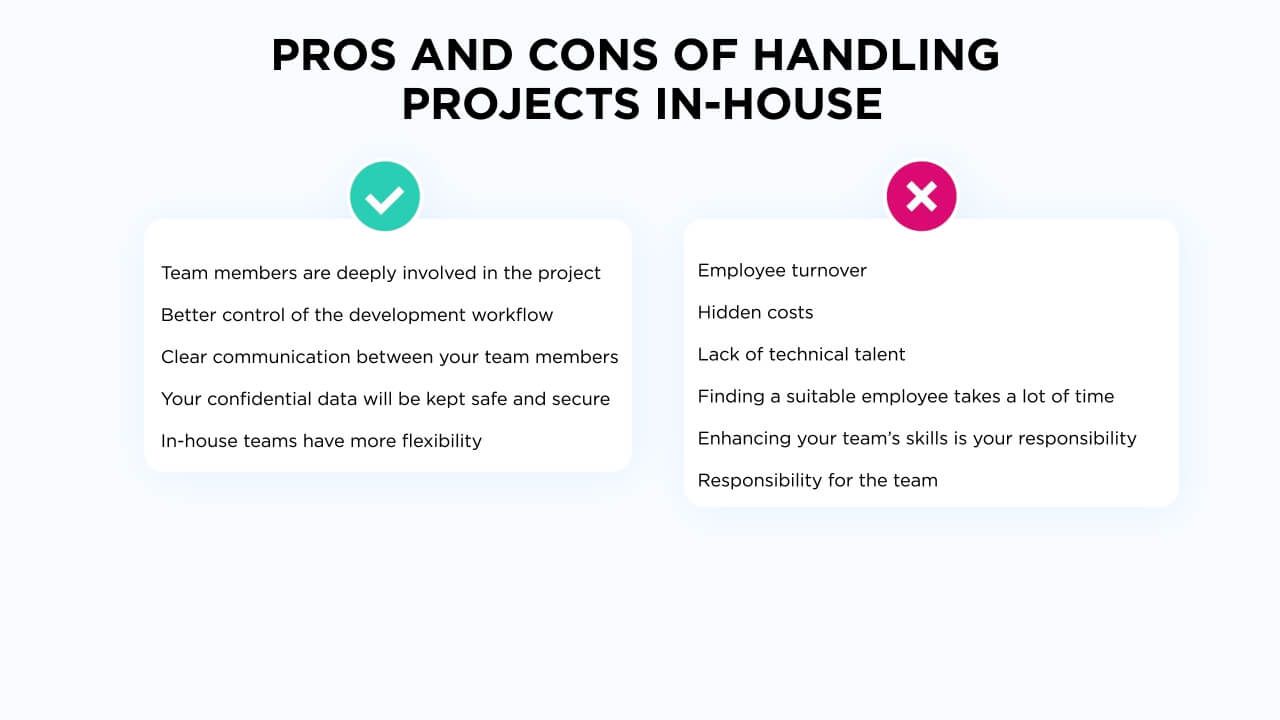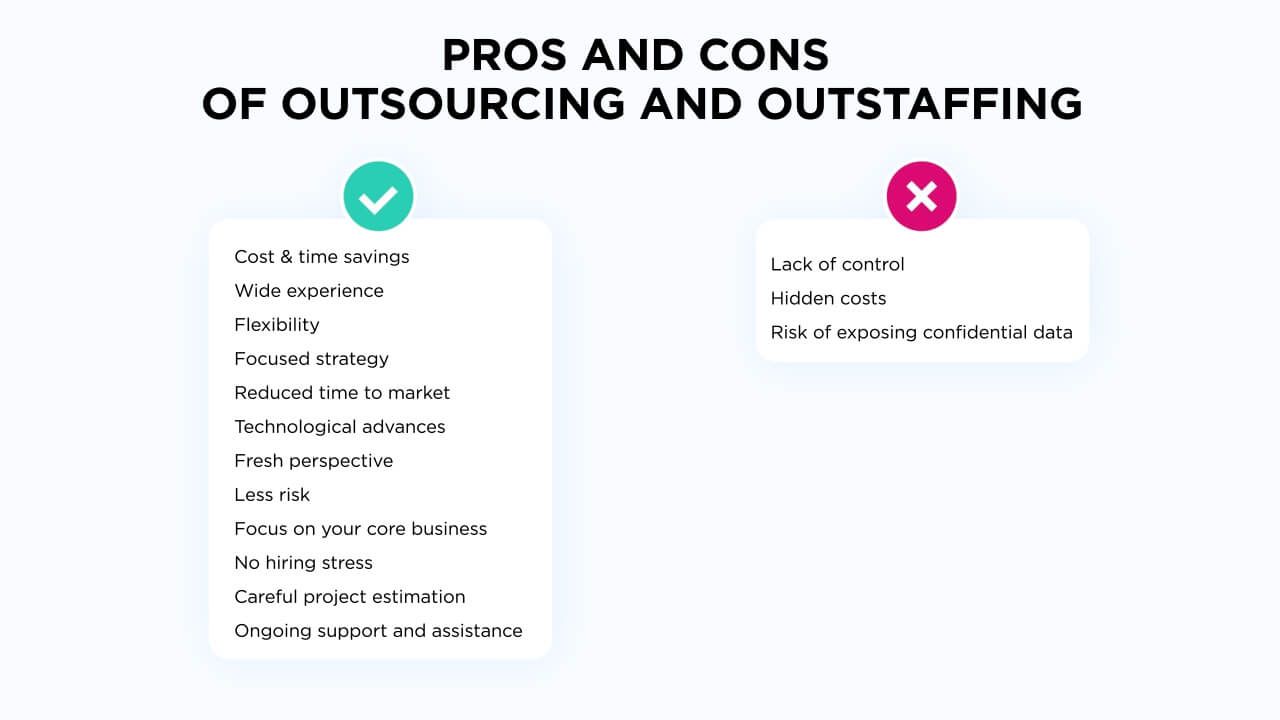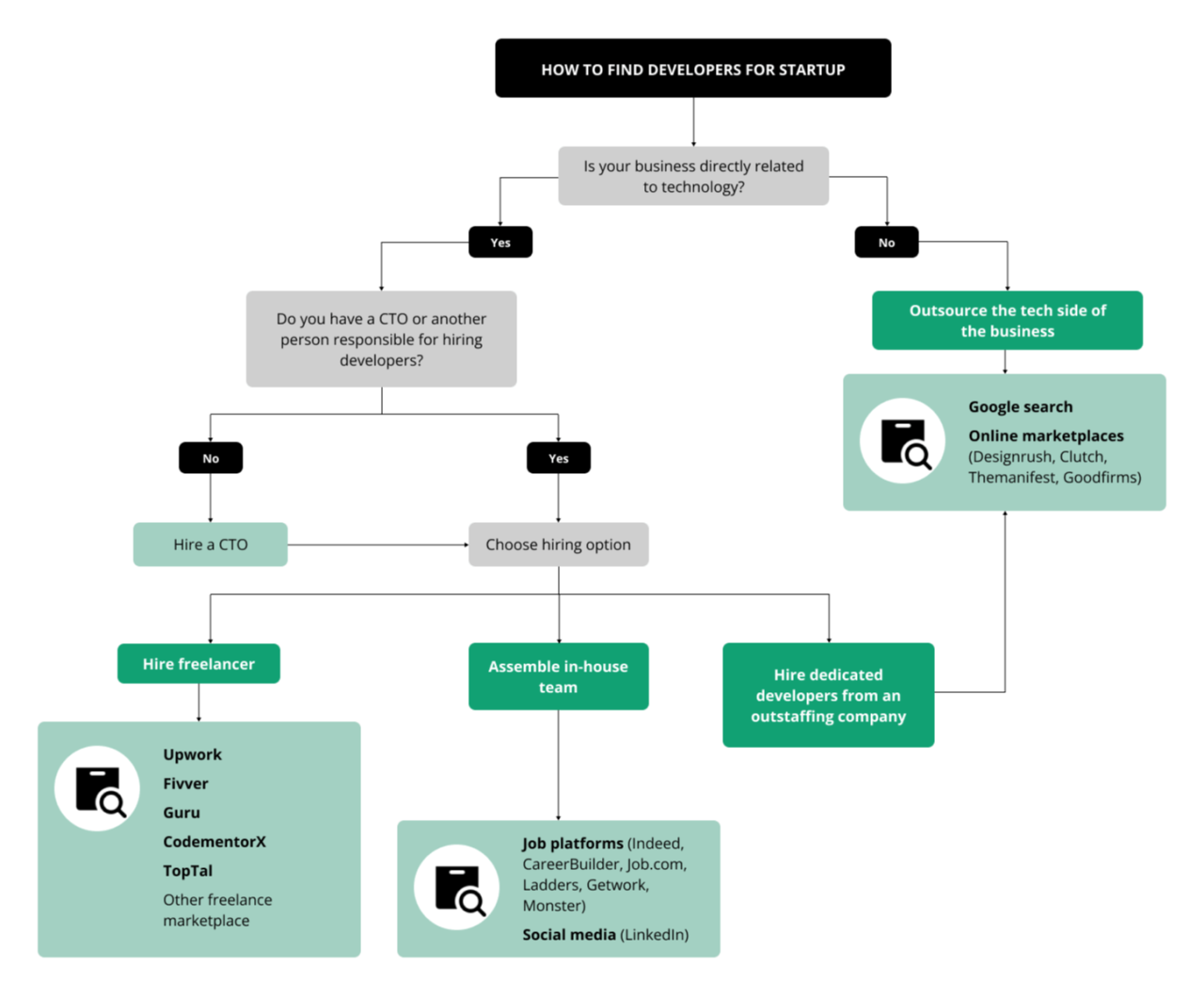How to Find Developers for Startup: 3 Steps

If you run a tech startup, you will at some point have to find and hire developers. And the fact is, hiring developers for a startup, especially an early-stage one, is extremely complicated.
But you don’t have to worry about. Today, many early-stage startups have resorted to an alternative form of hiring. They outsource their development needs to a third-party company or freelance developers. Companies like Slack or WhatsApp outsourced their development when they first started out.
In this article, we’ll talk about where and how you can find and hire developers for startups. But most significantly, we will help you to choose the most suitable out of the many options to solve this issue.
Here’s What We’ll Cover
Step 1: Identify Skills Gaps in your Development Team
In this section, we’ll cover how to identify your team’s skill gaps and how to close them afterwards. Then we’ll take a look at the main ways to fill skill gaps.
Performing a skills gap analysis will help you identify any gaps your team may have, and then address those gaps to help you achieve your startup goals. Here are the steps to take to identify the skills gaps in your startup.
- Identify important skills. Before assessing possible skill gaps, you should first identify the skills that are most essential to your startup and this position. You should consider not only the skills your team needs now, but also those that may be needed in the future.
- Measure current skills. Next, you need to assess the current skills of your employees, both at the individual and team level. In an individual assessment, you measure an employee’s skill level. In a team assessment, you assess the skills of the entire team and identify missing skills.
- Train or hire employees to fill skill gaps. Once you identify the gaps between existing and desired skills, you need to either train existing employees or hire new employees or contractors.
How to Fill Skills Gaps: Determine which developers you are looking for
Once you identify skill gaps, you can fill them. Below you will find the main ways to fill skill gaps in your teams.
- Software development with an in-house team. Choosing in-house development is similar to hiring full-time staff for your startup. Likewise, you will go through the process of hiring, interviewing, and onboarding to create your own development team from scratch. If your startup is focused on an IT product, it may make sense to hire employees in-house.
- Outsourcing team of developers. Outsourcing is a business practice in which certain company functions are assigned to outside service providers rather than performed in-house. In other words, a company seeks external help or support to perform some of its business activities, so it can stay focused on core business goals and save time and money.
- Freelance software developer. Working with freelancers means signing a contract with a self-employed worker who offers services for a fixed price or hourly rate and completes tasks within certain deadlines.
Step 2: Ways to Find Developers
Freelancer
Freelancing allows you to find talent all over the world. It is probably the most convenient option for short-term projects, since offshore developers tend to be more affordable than in-house developers, but no less competent.
The main downsides involve communication and teamwork. Freelance developers are unlikely to share your passion for the product, and working remotely may cause issues. For example, if your US-based startup is working with developers from India, you’ll have to consider cultural differences, local holidays, potential restrictions on communication in English, and an 8-12 hour time zone difference.
Pros and Cons of Hiring a Freelancer

Hiring freelance developers offers such advantages like saving time and money, a huge talent pool, and adaptability. But this type of cooperation also has many disadvantages. Among them are multitasking, lack of full integration and immersion into the project, low commitment to the startups’ vision, and difficulties in getting established.
Pros of Hiring a Freelancer
Below is a list of reasons why more and more companies are hiring freelancers:
- Cost savings. Hiring a freelancer allows your startup to cut costs without affecting productivity. For example, freelancers don’t need a workspace in your office or any training.
- Access to specific talent. If your startup requires a specific skill set for a project, you can find freelancers who are experts in their niche areas and can offer a service that simply none of your employees can provide.
- A larger talent pool. You can access more experienced developers from around the world to find exactly the talents, qualifications, and skills your startup needs.
- Flexibility of schedule. One of the main advantages of freelancers is that they can be hired at any day and time. This means that a freelancer can help you solve last-minute emergencies when required.
- Short deadlines. Freelancers are a great option for meeting fast-approaching deadlines. They can step in if you require extra support on a project or fill the absence of someone on your team.
- Fresh perspective. Freelancers can offer a unique idea that can be of great benefit to the project. This fresh perspective can be a solution to a main project challenge.
- Less supervision. Freelancers usually require a little supervision. They are likely to have already completed dozens of tasks and know how to approach a project quickly and competently, without asking for special guidance—in fact, their income depends on it.
Cons of Hiring a Freelancer
Let’s look at the reasons why hiring freelance developers is not the best choice for startups and SMBs.
- Productivity and quality of work. Freelancers do a good job, but no more than that. You can expect them to perform only necessary tasks, but not beyond that.
- Security issues. Since freelancers are independent workers, it is not recommended to entrust them with projects that may require them to have access to confidential information about your startup or clients.
- Availability. Freelancers may not have to adapt to your startup’s work schedule, since they work independently.
- Workflow setting. Freelancers have their own processes and workflows. You cannot expect them to do certain tasks in a specific way, since they are not part of your team.
- Building long-term relationships. Freelancers only perform tasks within a project. They don’t feel responsible for your success, will not make the effort to achieve business goals and improve relationships with clients.
- Satisfaction with the result. Freelancers usually work for several clients at once. They can’t devote all their time and attention to your project, which significantly affects productivity and satisfaction with the results.
When to Choose Freelance Software Developer
Freelancers are a good option for startups that are looking for developers for a short-term project. But if you expect to be fully immersed in the workflow, working on multiple aspects and cooperating closely with your team, hiring freelancers is clearly not what you need.
Where to Find Freelancers?
If you have definitely decided that you require a freelance developer, it’s time to figure out where and how to find the suitable employee. Let’s take a look at the most popular platforms for hiring freelancers.
- Toptal.com is a global platform for finding remote professionals in software development, design, business, and technology. According to the project representatives, only 3% of candidates are interviewed, which means that you will find only the best employees there. The main features and advantages of Toptal are the qualifications of their candidates, team dynamics, bottom-line financial. Note, that the commission is included in developers’ rates.
- Upwork.com is an international freelance exchange used by customers and performers from all over the globe. The platform offers three options for hiring candidates: Talent Marketplace, Project Catalog, and Talent Scout. The platform works in the following areas: development and IT, design and creative, sales and marketing, writing and translation, admin and customer support, finance and accounting, HR and training, legal, engineering, and architecture. The key benefits of the portal are proof of quality, no cost until hiring, safety and reliability. The commission is 3% from each payment.
- Freelancer.com is the world’s largest freelance website, that allows hiring the best remote specialists for any job, online. Among features and services of the portal are browsing portfolios of candidates and samples of their previous work, fast bids, quality work, tracking progress. You can post your project and immediately start receiving responses from remote specialists. You can also view the freelancers available on the site. The platform offers two options for searching — you can find a remote developer by skill or by location.
- Peopleperhour.com is the global freelance platform that allows finding an expert for anything and hiring the best freelancers to deliver any projects. With this portal you get matched with experienced remote specialists in minutes, receive a 24/7 customer service team, and have a money-back guarantee and anti-fraud protection.
How does it work? The hiring platform connects you with freelancers who can be hired on an hourly or project basis. You just need to describe your requirements, and the system will automatically match you with the best remote employees according to your need. Each freelancer then makes an individual offer. You should review the responses you receive, choose a resource, and make a deposit to start the project.
In-House Team
In-house development means you have your own team who have the necessary knowledge and skills to work on your project. Your in-house developers are familiar with your business goals, requirements, and internal processes. They handle all tasks completely, and you don’t have to reach out to a third-party company to complete any tasks. Well-known companies like Amazon, PayPal, and Salesforce prefer to hire in-house developers. But what are the benefits of this model?
Pros and Cons of Handling Projects In-House

Pros of In–House Development
- Team members are deeply involved in the project. Each member of the in-house team clearly understands the specifics of your business, knows its goals, and shares your vision. The internal team is able to quickly respond to changes in internal processes or specifications.
- Better control of the development workflow. You know exactly the strengths and weaknesses of your employees. This allows you to directly assign them relevant tasks, evaluate results on time, and fix problems as quickly as possible.
- Clear communication between your team members. In-house developers are likely to have a similar culture, social background, and language, which makes communication easier and avoids potential confusion.
- Your confidential data will be kept safe and secure. Keeping project documentation and knowledge in-house reduces the risk of losing sensitive data.
- In-house teams have more flexibility. Flexibility means the ability to make changes to your project right away. The in-house team is involved with your product only and doesn’t need to re-adjust schedules too much to make any updates.
Cons of In–House Development
- Employee turnover. Since developers can change jobs, you may encounter some labor issues and waste time. Finding new developers for the internal team is always time-consuming, so the development of your project may slow down for a while.
- Hidden costs. In-house development can be more expensive than working with third party companies. The final cost is made up of many expenses, such as rent, taxes, software, hardware, etc. There are additional costs, such as employee training, sick leave, and benefits for team members.
- Lack of technical talent. The growing software development market has led to a huge demand for technical specialists. Hiring the required specialists in certain areas can be tricky.
- Finding a suitable employee takes a lot of time. Usually, recruiters spend about 1.5 months to fill a position. They draft and publish job descriptions, review applications, and interview candidates. When new employees come on the team, it also takes several weeks to months to train and integrate them into the project.
- Enhancing your team’s skills is your responsibility. You’ll be sure your team keeps up with changes in the industry, especially if they affect the growth of your products. Investing in training and tools can make a big difference in the result of your startup.
- Responsibility for the team. By forming your in-house team, you partially assume responsibility for the professional future of your employees. So if the project fails, not only you but also your team will suffer and lose their jobs.
When to Choose In-House Software Development
Despite the higher expense, there are reasons to build your own team.
- You’re not limited by budget. If you have enough resources at your disposal, hiring an in-house team will provide you with a lot of benefits and just a few drawbacks.
- Full control over the process is required. With an in-house team, you can immediately resolve any issues that affect product development.
- Post-release stage. Let’s say you used software outsourcing to develop the MVP to see if its users would accept it. After collecting data and feedback, you can assemble a team, which will then take on the development of the final product. This scenario is less demanding for the startup and saves time: the process of finding an internal team runs along with outsourcing development.
- Long-term project. If you are planning to contract a project for more than a year, you should consider hiring your development team. In the long run, the cost of rent, salaries, and taxes will pay off. If you plan to spend less time, it is better to outsource development.
- You already have an IT infrastructure. Let’s say you own an IT product startup and decide to scale your product. In that case, it makes more sense to assemble a new team than to hire an outsourced development agency.
Where to Hire Developers for your Team?
Now, let’s talk about the most common recruiting practices.
- Recruiting Agency. Hiring a headhunting agency reduces your workload and allows you to focus on other tasks. The agency handles every stage of the recruitment process. As a result, you get only top-quality candidates who have been pre-qualified and interviewed. But this way is one of the most expensive—the agency’s commission for each talent can reach 25% of an employee’s annual salary.
- Job board. If you want to be completely involved in the hiring process and save money, it’s a good practice to post your offer on job portals, such as Indeed, LinkedIn Jobs, Remotive.io, WeWorkRemotely and AngelList. Usually, posting a job on these services is completely free. But this option has its drawbacks. Since anyone can apply for your position, you will receive tons of applications, but without quality control, and you have to waste time assessing candidates.
- Referrals. Hiring people through a network of professional connections is a good way to attract reliable professionals to your team. The referrer has already worked with his or her referral and can provide helpful information. This way, you can avoid initial assessment and interview. But keep in mind that the talent pool is limited, as your job offer can only apply to candidates who know you through one or two people.
- Developer Forums. Developer communities such as Stack Overflow, or Indiehackers can also be an option for finding talent for your project. Create your startup profile, add current offers, post a short job description and be active in discussions. Note that some forums provide specialized talent search pages, similar to job boards.
- Company career page. You can also create a special page on your site with job listings. You will, definitely, have to conduct screenings and interviews.
- Social Media. Today, many positions are posted on social media platforms such as Twitter, Instagram, Facebook, or LinkedIn. This approach has a lot in common with searching through referrals and creating a career page. Note, if you or your startups’ social accounts have a lot of connections, open positions can be filled within days.
Outsourcing and Outstaffing Companies

Let’s start this section with nailing down the terms.
- Outsourcing is a business practice in which specific company functions are assigned to outside service providers rather than performed in-house. In other words, a company seeks external help or support to perform some of its business activities, so it can stay focused on core business goals and save time and money.
- Outstaffing is a type of remote employment when a hired person carries out all the job duties for a startup, being officially employed by an outsourcing company. The latter one acts as an employer, thus is responsible for wages, bonuses, equipment granted to a worker, while a client company provides a worker with tasks and assignments.
Now that we got the sense of the terms, it’s time to move over to the pros and cons of these options.
Pros and Cons of Outsourcing and Outstaffing
Pros of outsourcing and Outstaffing
- Cost savings. Whether you require a team of 5 or 1000 developers, it is much more affordable to outsource an entire project than to hire in-house teams. Additionally, you don’t need to buy equipment or other supplies required for software development.
- Time savings. Software development takes less time when people work 24/7 to deliver your product within the deadlines you set. Also, you don’t have to spend time looking for new developers and then hiring and training them to suit your project needs.
- Wide experience. When the in-house team does not have the suitable experience to deliver the solution, then outsourcing will bring additional knowledge and power to do the task.
- Flexibility. Hiring a full-time in-house developer for short-term projects isn’t practical. Either you will have to keep him or her busy through the year with new projects. Or you will have to provide them with salary and other benefits even when they aren’t actually working. But, software development outsourcing gives you the option to choose developers for a single project. You can retain them for future projects or choose another developer if you want.
- Focused strategy. Your in-house team may have to deal with more than one project at a time. As a result, you will have to compromise on the quality and sometimes delay some projects. But, the outsourced team will focus entirely on your project and deliver high-quality outputs within the deadline.
- Reduced time to market. Being first in the market can be a critical factor for success. For those reasons, an outsourcing company is a great solution to gain control over the speed of your software development. Rather than letting your team dictate the timelines, you can scale a remote team to move forward much faster.
- Technological advances. By teaming up with an external company who has a proven track record of excellence, you can build cutting-edge solutions in the latest technologies without having to master the team.
- Fresh perspective. Building software frequently requires trying new approaches and thinking out-of-the-box. Remote team members might surprise you with unexpected feedback and fresh ideas about how to improve your project.
- Less risk. You can reduce risks by choosing a company that has a top-grade project management team with a tried-and-true process for software delivery and maintenance.
- Focus on your core business. Let the experts handle your product development so that you can focus on the core value of your business. In the long-run, this will help your startup grow and expand much more efficiently and rapidly.
- No hiring stress. If you choose a reliable outsourcing company, you don’t have to think about recruitment and the related problems at all. A dedicated team will make your project progress flawlessly. Also, the company will always make sure that your idea and project are safe and protected.
- Careful project estimation. An outsourcing company will provide you with a full range of services, including a detailed project estimation of how much money is needed, how many developers should be involved, how long the development, testing, and implementation will take. That way, you don’t have to do it by yourself.
- Ongoing support and assistance. In addition to their custom development services, IT companies provide you with the ongoing support and assistance. In comparison, freelancers will not be available all the time.
Cons of Outsourcing and Outstaffing
- Lack of control. When you sign a contract with an outsourcing vendor, you are effectively outsourcing the management of your task to another company. Your vendor will not be driven by the same goals and objectives as your company; they will likely be driven only by profit.
- Hidden costs. You sign a contract with the company you hire regarding the services they are going to provide. Keep in mind that any details not specified in the contract will cost extra.
- Risk of exposing confidential data. Any relationship between a company and an outsourcing provider is built on trust. But you should be careful not to hand over sensitive data to the software company, as this could create problems for your company.
When to Outsource Development
We recommend outsourcing software development when:
- At the beginning of your startup project. If you don’t have a profitable product yet, taking on payments, rent, and taxes is a high-risk business. If you outsource development services, you will have a detailed commercial proposal with deadlines and a plan without additional risks.
- For one-time or non-core tasks. If you need to develop a website or CMS, it’s easier to outsource development. Such a product doesn’t need a lot of improvements. You don’t need to assemble a full-time team or have a help desk.
- To address the lack of resources. When your team doesn’t have specific knowledge, you can outsource some processes. Let’s say you have web developers, but you need to build a mobile app, then outsourcing development is an option.
- Tight launch deadlines. If you have no experience in software development, you may encounter challenges and may not meet the deadline. And if you can’t afford delays, it’s better to bring in an experienced software development company.
- Budget limitation. You work on a limited budget and, like many startups, can’t afford a permanent team. Outsourcing provides you with more flexibility in cash flow without the obligation to pay salaries.
- Lack of special talents. For example, you cannot find the right experts in your region. Instead of spending months training newcomers, it is better to outsource this work to an IT outsourcing company.
- Tight launch deadlines. If you have no experience in software development, you may encounter challenges and may not meet the deadline. And if you can’t afford delays, it’s better to bring in an experienced software development company.
- Lack of clarity. When developing a complex solution, your own team may encounter gaps in turning business requirements into technical specifications. An outsourced company often has a project manager who can act as a middleperson between you and the developers.
Where to Find Outsourcing and Outstaffing Companies?
There are many ways to find and hire a software development company. Here are the most reasonable sources for finding one:
- References from your neighborhood. Start your research with referrals from your neighbors, friends, and colleagues.
- Job portals. You can also check well-known portals like Dice.com, and Glassdoor.com.
- Forums. For iOS or Android developers, check out forums such as the iPhoneDevSDK, iOS Developer, MacRumors, GDGs, Android Forums, AndroidPit, or Reddit.
- Repositories. Open-source repositories like GitLab and GitHub enable you to estimate developers’ skills and view code samples.
- Directories. Look through online directories and communities for developers such as They Make Apps, or Topcoder.com.
- B2B directories. B2B platforms like GoodFirms, Appfutura, Businessofapps, Softwareworld, Itfirms and Clutch list application development outsourcing companies, grouped by location, rating, and expertise.
- Design networks. Design communities such as Behance, Awwwards, or Dribble are also a good option for finding an outsourcing team.
- Tech blogs. Glance through mobile app development companies’ blog posts to determine whether the companies’ expertise fits your project idea.
- Social media to hire an app developer. LinkedIn, Facebook, and Twitter enable direct communication with experienced candidates.
Comparison of Hiring Options
Each option has its pros and cons, and each can be a viable choice in different scenarios. So which option should you choose for your business? The differences can be conveniently explained using a comparison table.
| Freelancer | In-house team | Outsourcing company | |
| Costs | Salary | Salary + benefits + infrastructure | Salary |
| Team Longevity | Short-term/Per project | Long-term | Per project |
| Micromanagement | Harder to implement | Easier to implement | Harder to implement |
| Communication | Remote | On-side | Both |
| Availability | Remote | On-side | Both |
| Scalability | Low | Low | High |
| Flexibility | Low | Low | High |
| Talent pool | Restricted | Restricted | Limitless |
| Decision-Making | On CEO’s side | On CEO’s side | On both sides |
| Resources | On both sides | On CEO’s side | On vendors side |
| Risks | On CEO’s side | On CEO’s side | On vendors side |
Step 3: Interview: Essential Questions to Ask the Developer
When looking for a developer, it is important to understand that there is no perfect candidate or perfect company. Your aim is to engage and hire the most suitable specialists. This applies to both professional skills and technical competencies, as well as so-called soft skills.
So, what questions will help you evaluate soft and hard skills of developers? Let’s see.
How to Screen Developers for Hard Skills?
These questions can be used to identify a candidate’s technical knowledge and abilities.
- What current certifications do you have?
- What coding languages are you familiar with? Which ones are you still learning?
- What online resources and utilities do you use to help you manage your business?
- What’s a new software or technology you’ve recently worked with?
- Define ‘authentication’ and ‘authorization’ and the tools used to support them in enterprise deployment.
- What development tools have you used?
- Describe the most innovative change that you initiated and how you implemented the change?
- How do you ensure quality in your deliverables?
- Describe your process for deployment to a production environment.
- How do you feel about Agile? Explain its benefits and drawbacks.
- What strengths do you think are most important for this position?
- What technical websites do you follow and why?
- Do you prefer service-oriented or batch-oriented solutions, and why?
How to Screen Developers for Soft Skills?
You can use the following questions to assess a candidate’s personal traits and cognitive skills.
- If you could master one technology this year, which would you choose, and how would you go about doing it?
- What were the last questions you viewed on Stack Overflow? What were the last questions you answered?
- If you were falling behind schedule, what would you do?
- Tell me about a time you had to deal with a difficult colleague. What did you do to communicate properly?
- How would you explain this term to someone from a different discipline?
- Tell me about a time you had to deal with a team member who constantly opposed your ideas
- How would you react if a team leader encouraged competition between team members instead of collaboration?
- Tell me about a time you took the lead when your team was in a difficult position
- What would you do if your team members disagreed with your instructions?
- Tell me about a time when a project’s priorities changed suddenly, and you had to adapt
- What would you do if you were assigned multiple tasks with the same deadline?
- Tell me about a time you had to make a decision with incomplete information
- If you spotted a mistake in a report, but your manager wasn’t available, what would you do?
- Tell me about a time you faced an ethical dilemma at work
- If you discovered your supervisor was breaking the company’s code of conduct, what would you do?
Summary: Quick Gide to Find Developers
So, all options have their pros and cons. And each startup should choose an option based on its business goals, needs, and resources.
To help you decide in this battle, we have designed a customer journey map that will explain and simplify this difficult process.
With the answers in one hand and our article in the other, you will be able to make a smart choice. If you decide to outsource software, don’t hesitate to contact our experts. We will always be ready to help you with outsourced development.


 (5 votes, average: 4.20 out of 5)
(5 votes, average: 4.20 out of 5)


